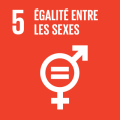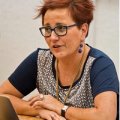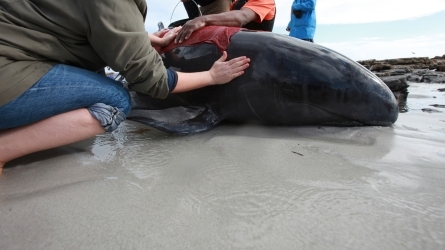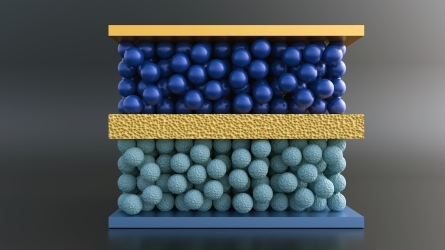
Karmele Jaiorekin literaturaz
Description
Uda Ikastaroa aurrez aurre ospatuko da eta online zuzenean parte hartzeko aukera ere egongo da ZOOM bidez. Matrikula prozesuan nola parte hartuko duzun aukeratu: aurrez-aurre edota online zuzenean.
Karmele Jaioren literaturaz arituko gara Uda Ikastaro honetan eta horretarako, egilea bera izango dugu gure artean. Jaioren literatur ibilbidea aztertu duten adituekin solasean abiatuko gara eta bere unibertso literarioa alderik alde zeharkatzen duten obsesio eta helburuak izango ditugu hizpide. Hiru ipuin libururen egilea da Jaio: Hamabost zauri (Elkar, 2004) Zu bezain ahul (2007, Elkar) eta Ez naiz ni (2012, Elkar), eta beste hainbeste eleberriena: Amaren eskuak (2006, Elkar); Musika airean (2010, Elkar); eta azken Euskadi Sariaren irabazle den Aitaren etxea (Elkar, 2019). Horiekin batera, Orain hilak ditugu (2015, Elkar) poema liburua ere kaleratu du Jaiok, eta guztietan gailentzen da genero rolek mugatzen dituzten pertsonaien arteko ixilune, inkomunikazio edo desiretan barneratzeko gaitasuna. Emakumezkoak dira gehienetan Jaioren literatur lanetako protagonistak eta euren begirada, oroimen, edo keinuei esker barneratzen gara euren barrunbeetan, euren emozioetan. Mireia Gabilondok maisuki egokitu zuen Jaioren eleberri ezaguna bere Amaren eskuak (2012) filmean, eta bera ere gurekin izango dugu.
Objectives
Karmele Jaioren obra aztertu eta obraz solas egitea.
Jaioren literatur lanetan nabermentzen den genero politikaz aritu eta baita maskulinitate/feminitate ereduez ere.
Karmele Jaioren literatur lanen zinema-egokitzapenez hausnarketa egin.
Jaioren obren itzulpenak aztertu.
Activity directed to
- University students
- Students not from university
- Teachers
- Professionals
- All public
Program
02-09-2021
Presentation by the Director of the activity
- Mari Jose Olaziregi Alustiza | EHU/UPV - Zuzendaria
“Literatura idatzi, literatura bizi“
- Karmele Jaio Eiguren | Idazlea
“Iragan gatazkatsuaren irudi espektralak Jaioren eleberrietan“
- Mari Jose Olaziregi Alustiza | EHU/UPV-MHLI - Irakasle titularra
“Géneros y formas de las corporealidades cotidianas en La casa del padre, de Karmele Jaio“
- Meri (María Ángeles) Torras Francés | UAB - Profesora titular
“Gorputz urezkoaren uhina: Karmele Jaioren olerkigintzara hurbilpen bat“
- Ane Villagran Arrastoa | UPV/EHU.MHLI
“Mireia Gabilondoren "Amaren eskuak" filmaren proiekzioa eta solasaldia“
- Karmele Jaio Eiguren | Idazlea
03-09-2021
“Karmele Jaio itzultzen“
- Miren Ibarluzea Santisteban | UPV7EHU-MHLI - irakaslea
“Los hombres expuestos: Masculinidad, patrilinealidad y feminismo en los relatos de Karmele Jaio“
- Iker Gonzalez Allende | University of Nebraska-Lincoln - ZOOM BIDEZ
“(Euskal) identitate eguneratuen mimesia: epika eta etika Karmele Jaioren narrazioetan“
- Larraitz Ariznabarreta Garabieta | Center for Basque Studies-University of Nevada, Reno
17:00 Tea Karmele Jaiorekin Miramar Jauregiaren lorategietan
Directors
Mari Jose Olaziregi holds a PhD in Basque literature. She is a Full Professor at the University of the Basque Country (Spain), and between 2007-2009 Assistant Professor at the Center for Basque Studies (University of Nevada, Reno), and Visiting Professor at universities like the University of Konstanz, the University of Chicago or the City University of New York. She holds a MA in Studies in Fiction at the University of East Anglia (UK). She specializes in contemporary Basque and Iberian literature, Comparative Literature, Basque Cultural and Gender Studies, and Memory Studies. She is the author of 11 books on Basque literature, 92 book-chapters, 18 edited books, and 81 articles in international journals. Mari Jose Olaziregi is a correspondent member of the Royal Academy of the Basque Language, and between 2010-2016, the Director of the Language and Universities Area at Etxepare Basque Institute. Lastly, she is a member of different international research-groups or networks, such as, the Groups “Celt”, “Liter21” and “Lijmi” (University of Santiago de Compostela, Spain; 2006-), or the Research Network “Memory and Narration” (University of Aarhus). Since 2012, she coordinates the MHLI Research Group.
Speakers

Larraitz Ariznabarreta Garabieta
Center for Basque Studies
Larraitz Ariznabarreta (Bilbao 1968) graduated and obtained her Doctorate at the University of Deusto, Bilbao. She has taught at Boise State University and the University of Deusto (Basque Country, Europe). Her fields of research deal with the analysis of various expressions of Basque culture and its relations with power. She is the author of the books Martin Ugalde: Cartografías de un discurso (Ekin. Buenos Aires, 2015) and Notes on Basque Culture: The aftermath of epics (CLAEH, Montevideo, 2019). She is also the editor of several volumes. Her last articles include “Siete casas en Francia: balance revisado” [ El mundo está en todas partes. El universo literario de Bernardo Atxaga (Anthropos, 2018)]; "Without exile who am I? Metaphors of Basque Exile and Discursive Traces of Subalternity" [National Identities at the Crossroads: Literature, Stage and Visual Media in the Iberian Peninsula (Francis Boutle, 2018)]; “Women Bertsolari’s Presence in a Sort of History’s Comeback” [ Female Impr

Iker Gonzalez Allende
Iker González-Allende is Leland J. and Dorothy H. Olson Professor of Modern Languages and Literatures, and Professor of Hispanic Studies at the University of Nebraska-Lincoln. He specializes in the Spanish Civil War, exile and migration, Basque studies, gender and queer studies, and autobiographical writing. He has published seven books: the monographs Hombres en movimiento: Masculinidades españolas en los exilios y emigraciones, 1939-1999 (Purdue University Press, 2018) and Líneas de fuego: Género y nación en la narrativa española durante la Guerra Civil (1936-1939) (Biblioteca Nueva, 2011); a critical edition of the novel Euzkadi en llamas, by Ramón Belaustegigoitia (Txalaparta, 2020); the edited volumes El mundo está en todas partes: La creación literaria de Bernardo Atxaga (coedited with José Ángel Ascunce Arrieta, Anthropos, 2018) and El exilio vasco: Estudios en homenaje al profesor José Ángel Ascunce Arrieta (Universidad de Deusto, 2016); and the editions of Pilar de Zubiaurre’s works, titled Evocaciones: Artículos y diario (1909-1958) (Saturrarán, 2009) and Epistolario de Pilar de Zubiaurre (1906-1970) (Tamesis, 2014). He has also published more than 60 articles in books and academic journals.
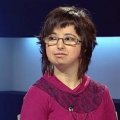
Miren Ibarluzea Santisteban
UPV/EHU, irakaslea
After a while working in the field of translation, publishing and edition of school texts, she obtained her international PhD in 2017 in the Department of Basque Linguistics and Basque Studies in the UPV/EHU (the PhD received the 2018/19 special doctoral prize and the 2018 Koldo Mitxelena VI Prize). She obtained the European Master in Multilingual Education organized by UPV/EHU and the University of Groningen (2020). Her research focuses on Basque translation studies and language teaching: history, critics and sociology of translation, representations and habits of translation, multilingualism, integrated and integral language curriculum. She was employed as a Basque Language and Culture Lecturer in France (Université Michel de Montaigne-Bordeaux 3 & Université Sorbonne Nouvelle - Paris 3; 2011-2015). Since 2016-2017 she teaches in the Department of Language and Literature didactics in the faculty of Education of Bilbao and she is member of MHLI research-group (MHLI: www.mhli.net).

Karmele Jaio Eiguren
Idazlea
Karmele Jaio Eiguren (Gasteiz, 1970). Hiru ipuin liburu –Hamabost zauri (Elkar, 2004), Zu bezain ahul (Elkar, 2007) eta Ez naiz ni (Elkar, 2012), hiru nobela –Amaren eskuak (Elkar, 2006) Musika airean ( Elkar, 2009) eta Aitaren etxea (Elkar, 2019)–, eta poesia liburu bat –Orain hilak ditugu (2015,Elkar) argitaratu ditu. Amaren eskuak nobelaren ingelesezko itzulpenak, Her mother’s hands (Parthian Books), English PEN Translation Award saria jaso zuen eta Aitaren etxea nobelarekin 2019ko Euskadi Literatura Saria eta 111 Akademiarensariak irabazi ditu, beste sari batzuen artean. Bere lanak hainbat hizkuntzatara itzuli dira. Bere ipuinak Best European Fiction 2017 eta beste hainbat antologietan argitaratu dira. Amaren eskuak nobelan oinarrituta, izen bereko pelikula egin zuen Mireia Gabilondo zuzendariak (2013an aurkeztu zen Donostiako Zinemaldian) eta Ecografías ipuina antzerkirako moldatu zuen Ramón Barea zuzendariak 2010ean. Euskaltzain urgazle da 2015. urtetik.
Mari Jose Olaziregi holds a PhD in Basque literature. She is a Full Professor at the University of the Basque Country (Spain), and between 2007-2009 Assistant Professor at the Center for Basque Studies (University of Nevada, Reno), and Visiting Professor at universities like the University of Konstanz, the University of Chicago or the City University of New York. She holds a MA in Studies in Fiction at the University of East Anglia (UK). She specializes in contemporary Basque and Iberian literature, Comparative Literature, Basque Cultural and Gender Studies, and Memory Studies. She is the author of 11 books on Basque literature, 92 book-chapters, 18 edited books, and 81 articles in international journals. Mari Jose Olaziregi is a correspondent member of the Royal Academy of the Basque Language, and between 2010-2016, the Director of the Language and Universities Area at Etxepare Basque Institute. Lastly, she is a member of different international research-groups or networks, such as, the Groups “Celt”, “Liter21” and “Lijmi” (University of Santiago de Compostela, Spain; 2006-), or the Research Network “Memory and Narration” (University of Aarhus). Since 2012, she coordinates the MHLI Research Group.

Meri (María Ángeles) Torras Francés
Meri Torras es profesora de teoría de la literatura y literatura comparada en la Universitat Autònoma de Barcelona (España). Sus trabajos de investigación versan sobre ámbitos como la autografía, la identidad, la autoría, el cuerpo, el género y la sexualidad, con especial dedicación al comparatismo entre literatura y artes audiovisuales. Ha sido profesora invitada en varias universidades europeas y latinoamericanas. Entre sus publicaciones, destacaremos, Feminismos literarios (1999), Los papeles del autor (2016) y ¿Qué es una autora? (2019). Desde 2005 dirige el grupo investigador "Cuerpo y Textualidad" (http://cositextualitat.uab.cat), y desde 2018/19 es coordinadora del primer Grado en Estudios de Género del ámbito español.

Ane Villagran Arrastoa
Euskal Herriko Unibertsitatea
Ane Villagran Arrastoa (Donostia, 1995). Euskal Ikasketetan graduatu zen (2017) Euskal Herriko Unibertsitatean (UPV/EHU). Euskal Hizkuntzalaritza eta Filologia Masterra (2018) egin zuen Euskal Herriko Unibertsitatean (EHU) eta Derrigorrezko Bigarren Hezkuntzako eta Batxilergoko Lanbide Heziketako eta Hizkuntzen Irakaskuntzako Irakasleen Prestakuntzako Masterra Valentziako Nazioarteko Unibertsitatean. Gaur egun, Euskal Hizkuntzalaritza eta Filologia doktorego programako doktoregaia da. Ikerketa-proiektua kotutoretzan gauzatzen ari da Euskal Herriko Unibertsitatea eta Bordeaux Montaigne (UBM) unibertsitatearekin eta Eusko Jaurlaritzak ematen duen “Ikertzaileak prestatzeko Doktoretza-aurreko Programako laguntza” jasotzen du horretarako. Tesiaren helburua emakumeek idatzitako euskal poesia garaikidea aztertzea da. Halaber, Memoria Historikoa Literatura Iberiarretan ikerketa-taldeko kidea da.
Registration fees
| Face-to-face | Until 10-05-2021 | Until 02-09-2021 |
|---|---|---|
| 0 EUR | - | |
| - | 77,00 EUR | |
| - | 65,00 EUR | |
| - | 54,00 EUR | |
| - | 65,00 EUR | |
| - | 65,00 EUR | |
| - | 65,00 EUR | |
| - | 0 EUR |
Venue
Miramar Palace
Pº de Miraconcha nº 48. Donostia / San Sebastián
Gipuzkoa
Miramar Palace
Pº de Miraconcha nº 48. Donostia / San Sebastián
Gipuzkoa
Sustainable development goals
Agenda 2030 is the new international development agenda approved in September 2015 by the United Nations. This agenda aims to be an instrument to favour sustainable human development all over the planet, and its main pillars are the eradication of poverty, a reduction in equality and vulnerability and fostering sustainability. It is a unique opportunity to transform the world up to 2030 and guarantee human rights for all.

5 - Gender equality
Achieve gender equality and empower all women and young girls. Key issues: the end of all forms of discrimination and violence, recognition of unpaid care and domestic work, shared responsibility, equal opportunities, full and effective participation in reproductive rights, equal rights vis-à-vis economic resources, access to land and other assets and ownership.
More information